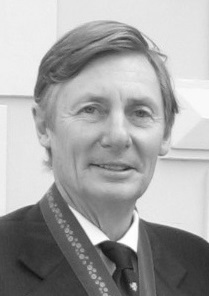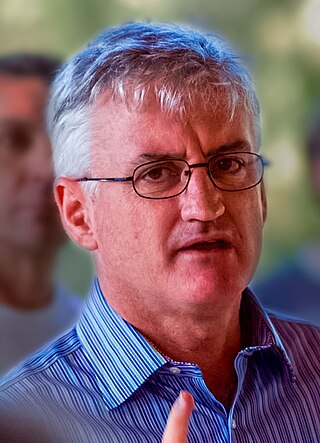Related Research Articles

State elections were held in South Australia on 25 November 1989. All 47 seats in the South Australian House of Assembly were up for election. The incumbent Australian Labor Party led by Premier of South Australia John Bannon defeated the Liberal Party of Australia led by Leader of the Opposition John Olsen. Labor won 22 out of 47 seats, and secured a majority of 24 with the support of two Independent Labor members.

The 2002 Cunningham by-election was held in the Australian electorate of Cunningham in New South Wales on 19 October 2002. The by-election was triggered by the resignation of the sitting member, the Australian Labor Party's Stephen Martin on 16 August 2002. The writ for the by-election was issued on 16 September 2002.

The 2008 Western Australian state election was held on Saturday 6 September 2008 to elect 59 members to the Legislative Assembly and 36 members to the Legislative Council. The incumbent centre-left Labor Party government, in power since the 2001 election and led since 25 January 2006 by Premier Alan Carpenter, was defeated by the centre-right Liberal Party opposition, led by Opposition Leader Colin Barnett since 6 August 2008.
This is a list of members of the Western Australian Legislative Assembly from 1986 to 1989:
Bernard Kent Masters is a former Australian member of parliament who served as a member of the Legislative Assembly of Western Australia from 1996 to 2005, representing the seat of Vasse. He was a member of the Liberal Party until 2004, when he resigned to sit as an independent.
Frederick Charles Tubby is a former Australian politician.

The 2018 South Australian state election to elect members to the 54th Parliament of South Australia was held on 17 March 2018. All 47 seats in the House of Assembly or lower house, whose members were elected at the 2014 election, and 11 of 22 seats in the Legislative Council or upper house, last filled at the 2010 election, were contested. The record-16-year-incumbent Australian Labor Party (SA) government led by Premier Jay Weatherill was seeking a fifth four-year term, but was defeated by the opposition Liberal Party of Australia (SA), led by Opposition Leader Steven Marshall. Nick Xenophon's new SA Best party unsuccessfully sought to obtain the balance of power.
Edgar Cyril Rushton was an Australian politician who was a Liberal Party member of the Legislative Assembly of Western Australia from 1965 to 1988. He served as a minister in the governments of Charles Court and Ray O'Connor, including as deputy premier to O'Connor from 1982 to 1983.
William Hawkins Sewell was an Australian politician who was a Labor Party member of the Legislative Assembly of Western Australia from 1950 to 1974, representing the seat of Geraldton.
Reginald John Tubby was an Australian politician who was a Liberal Party member of the Legislative Assembly of Western Australia from 1975 to 1989, representing the seat of Greenough.
The 1991 Floreat state by-election was a by-election for the seat of Floreat in the Legislative Assembly of Western Australia held on 20 July 1991. It was triggered by the resignation of Andrew Mensaros on 16 May 1991, due to ill health. He died before the by-election was held. The election was won by an independent candidate, Liz Constable, who finished with 58.94 percent of the two-candidate-preferred vote. Constable became the first woman to win election to the Parliament of Western Australia as an independent, and only the third woman overall to win a by-election.
The 1990 Cottesloe state by-election was a by-election for the seat of Cottesloe in the Legislative Assembly of Western Australia held on 11 August 1990. It was triggered by the resignation of Bill Hassell on 28 June 1990. The Liberal Party retained Cottesloe at the election with an increased majority, with Colin Barnett securing 70.26 percent of the two-party-preferred vote. The Labor Party did not field a candidate.
A by-election for the seat of Victoria Park in the Legislative Assembly of Western Australia was held on 10 February 1945. It was triggered by the death of the sitting member, Howard Raphael of the Labor Party, on 9 December 1944. The election was won by an independent candidate, William Read, who finished with 56.7 percent of the two-candidate-preferred vote. Outside of Read's victory, the election was also notable as the first in Western Australia to be contested by the newly established Liberal Party.
The 1991 Geraldton state by-election was a by-election for the seat of Geraldton in the Legislative Assembly of Western Australia held on 20 July 1991. It was triggered by the resignation of Jeff Carr on 28 February 1991, due to his expulsion from cabinet. The election was won by the Liberal candidate, Bob Bloffwitch, who won 51.4 percent of the two-candidate-preferred (2CP) vote. The National Party also made the final 2CP count, despite having not stood a candidate in Geraldton since the 1974 state election, whereas Labor slumped to just 16.6 percent on first preferences, a swing of 31 points from the 1989 state election.
A by-election for the seat of Boulder in the Legislative Assembly of Western Australia was held on 4 December 1948. It was triggered by the death of Philip Collier, a former premier, on 18 October 1948. The Labor Party retained the seat at the election, with Charlie Oliver winning 78.9 percent of the first-preference vote.
A by-election for the seat of Guildford-Midland in the Legislative Assembly of Western Australia was held on 13 March 1948. It was triggered by the death of the sitting member, William Johnson of the Labor Party, on 26 January 1948. The Labor Party retained the seat, with John Brady recording 53.7 percent of the two-party-preferred vote. The election was notable for the performance of the Communist Party candidate, Alexander Jolly, who polled 19.3 percent on first preferences.
The 1994 Helena state by-election was a by-election for the seat of Helena in the Legislative Assembly of Western Australia held on 10 September 1994. It was triggered by the resignation of Gordon Hill on 4 August 1994. The election was won by the Liberal Party, with their candidate, Rhonda Parker, recording 52.1 percent of the two-party-preferred vote. Parker became the first woman from the Liberal Party to win a by-election in Western Australia, and the fifth overall. Richard Court's government became the first sitting government to increase its majority at a by-election since 1943, when John Willcock's Labor government won East Perth from an independent.
A by-election for the seat of Ascot in the Legislative Assembly of Western Australia was held on 13 November 1971. It was triggered by the death of Merv Toms, the serving Labor member and Speaker of the Legislative Assembly, on 8 October 1971.
A by-election for the seat of Nedlands in the Legislative Assembly of Western Australia was held on 9 June 2001. It was triggered by the resignation of Richard Court, the sitting Liberal member and a former premier, on 27 April 2001. The Liberal candidate at the by-election, Sue Walker, retained the seat with 53.4 percent of the two-candidate-preferred (2CP) vote, a negative swing of 1.5 points from the 2001 state election. The Greens made the final 2CP count for only the second time in their history.
A by-election for the seat of Greenough in the Legislative Assembly of Western Australia was held on 1 November 1975. It was triggered by the resignation of Sir David Brand on 21 August 1975. The Liberal Party retained Greenough at the by-election, with its candidate, Reg Tubby, winning 57.3 percent of the two-candidate-preferred (2CP) vote. However, the party suffered a swing of 33.6 points on first preferences, in part due to the entry of two parties that had not stood in Greenough at the 1974 state election. The Workers Party was in fact making its electoral debut, and surprised most observers by polling 13 percent on first preferences.
References
- ↑ Edgar Cyril Rushton – Biographical Register of Members of the Parliament of Western Australia. Retrieved 12 February 2017.
- ↑ Black, David; Prescott, Valerie (1997). Election statistics, Legislative Assembly of Western Australia, 1890-1996. Perth, Western Australia: Parliamentary History Project and Western Australian Electoral Commission. p. 79. ISBN 0-7309-8409-5.
- ↑ Frederick Charles, Biographical Register of Members of the Parliament of Western Australia. Retrieved 17 February 2017.